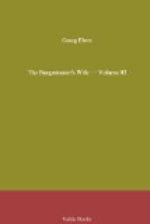All three phases of time belong to man, the past to the graybeard, the future to youth, and the present to childhood. What cared the little boys and girls of Leyden, released from school during the fair, for the peril close at hand? Whoever, on the first day and during the great linen-fair on Friday and the following days, received spending money from parents or godparents, or whoever had eyes to see, ears to hear, and a nose to smell, passed through the rows of booths with his or her companions, stopped before the camels and dancing-bears, gazed into the open taverns, where not only lads and lasses, but merry old people whirled in the dance to the music of bagpipes, clarionets and violins— examined gingerbread and other dainties with the attention of an expert, or obeyed the blasts of the trumpet, by which the quack doctor’s negro summoned the crowd.
Adrian, the burgomaster’s son, also strolled day after day, alone or with his companions, through the splendors of the fair, often grasping with the secure sense of wealth the leather purse that hung at his belt, for it contained several stivers, which had flowed in from various sources; his father, his mother, Barbara and his godmother. Captain Van Duivenvoorde, his particular friend, on whose noble horse he had often ridden, had taken him three times into a wafer booth, where he eat till he was satisfied, and thus, even on the Tuesday after Ascension-Day, his little fortune was but slightly diminished. He intended to buy something very big and sensible: a knight’s sword or a cross-bow; perhaps even—but this thought seemed like an evil temptation—the ginger-cake covered with almonds, which was exhibited in the booth of a Delft confectioner. He and Bessie could surely nibble for weeks upon this giant cake, if they were economical, and economy is an admirable virtue. Something must at any rate be spared for “little brothers,”—[A kind of griddle or pancake.]—the nice spiced cakes which were baked in many booths before the eyes of the passers-by.
On Tuesday afternoon his way led him past the famous Rotterdam cake-shop. Before the door of the building, made of boards lightly joined together and decked with mirrors and gay pictures, a stout, pretty woman, in the bloom of youth, sat in a high arm-chair, pouring rapidly, with remarkable skill, liquid dough into the hot iron plate, provided with numerous indentations, that stood just on a level with her comfortably outspread lap. Her assistant hastily turned with a fork the little cakes, browning rapidly in the hollows of the iron, and when baked, laid them neatly on small plates. The waiter prepared them for purchasers by putting a large piece of yellow butter on the smoking pile. A tempting odor, that only too vividly recalled former enjoyment, rose from the fireplace, and Adrian’s fingers were already examining the contents of his purse, when the negro’s trumpet sounded and the quack doctor’s cart stopped directly in front of the booth.




